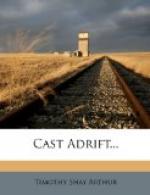The sight troubled him. He turned with a quick, disturbed movement and put the candle down. The light streaming upward into his face showed the countenance of a man so degraded by intemperance that everything attractive had died out of it. His clothes were scanty, worn almost to tatters, and soiled with the slime and dirt of many an ash-heap or gutter where he had slept off his almost daily fits of drunkenness. There was an air of irresolution about him, and a strong play of feeling in his marred, repulsive face, as he stood by the table on which he had set the candle. One hand was in his pocket, fumbling over the few pennies yet remaining there.
As if drawn by an attraction he could not resist, his eyes kept turning to the spot where Andy lay sleeping. Once, as they came back, they rested on the mug from which the child had taken his supper of bread and milk.
“Poor little fellow!” came from his lips, in a tone of pity.
Then he sat down by the table and leaned his head on his hand. His face was toward the corner of the room where the child lay. He still fumbled the small coins in his pocket, but after a while his fingers ceased to play with them, then his hand was slowly withdrawn from the pocket, a deep sigh accompanying the act.
After the lapse of several minutes he took up the candle, and going over to the bed, crouched down and let the light fall on Andy’s face. The large forehead, soiled as it was, looked white to the man’s eyes, and the brown matted hair, as he drew it through his fingers, was soft and beautiful. Memory had taken him back for years, and he was looking at the fair forehead and touching the soft brown hair of another baby. His eyes grew dim. He set the candle upon the floor, and putting his hands over his face, sobbed two or three times.
When this paroxysm of feeling went off, he got up with a steadier air, and set the light back upon the table. The conflict going on in his mind was not quite over, but another look at Andy settled the question. Stooping with a hurried movement, he blew out the candle, then groped his way over to the bed, and lying down, took the child in his arms and drew him close to his breast. So the morning found them both asleep.
CHAPTER XIX.
MR. DINNEFORD had become deeply interested in the work that was going on in Briar street, and made frequent visits to the mission house. Sometimes he took heart in the work, but oftener he suffered great discouragement of feeling. In one of his many conversations with Mr. Paulding he said,
“Looking as I do from the standpoint gained since I came here, I am inclined to say there is no hope. The enemy is too strong for us.”
“He is very strong,” returned the missionary, “but God is stronger, and our cause is his cause. We have planted his standard here in the very midst of the enemy’s territory, and have not only held our ground for years, but gained some victories. If we had the people, the churches and the law-officers on our side, we could drive him out in a year. But we have no hope of this—at least not for a long time to come; and so, as wisely as we can, as earnestly as we can, and with the limited means at our control, we are fighting the foe and helping the weak, and gaining a little every year.”




